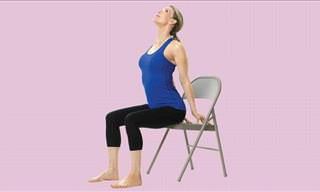It may be your desk job
Upper back pain is most common from poor posture. So if you tend to sit and stare at a computer while slouching, it shortens your chest muscles and pulls on the muscles in the upper back. This can cause a lot of people to get a muscle spasm between the shoulder blades as a result.
It could also be stress
Along with bad posture, strain in the muscles around the neck and shoulders or between the shoulder blades can be multi-factorial. Stress, strenuous exercise or sleeping with your neck in a weird position may contribute to pain.
What you can do
If it's a typical episode of muscle train, this will usually last a few days and resting at home is sufficient. It is essential that you stay comfortable during this time. You should rest, apply ice and take anti-inflammatory medications like ibuprofen or naproxen.
When to go to the doctor
Discomfort is not always no big deal. If pain lingers for more than a few days or it requires regular pain medications, you should be evaluated by a physician. If the pain limits your abilities in your day-to-day life and would mean that you need to call off work to stay in bed, seek medical help immediately.
The ache won’t go away
If you've done all you could, from DIY treatments to massages and even purchased a new mattress but your upper back in persistently hurting, it may, albeit rare, be a sign of lung tumor. The American Cancer Society points out that advanced lung cancer may contribute to bone pain. Weight loss, chest pain, and weakness are also signs of lung cancer.
You were in a car accident
If you're able to walk away from a rear-end crash and feel OK, you may still want to get checked out by a doctor. Whiplash is a violent backward-and forward jerk of the head which can create tears and inflammation of the muscles and ligaments in the neck and upper back. If you suspect whiplash, you may want to see a doctor, especially if it is accompanied by other symptoms like fatigue, dizziness, and pain in your neck.
You feel pain in the side, too
If you've ever had a kidney stone, you know that they can be agonizing, and they may cause upper back pain. However, it's unlikely that this is the only symptom you will notice. You may also feel severe pain in your side and back below your ribs. If you experience discomfort while peeing, or your urine appears reddish or brownish, it may indicate kidney stones. But the best advice you can take is if the pain is severe and persistent, it's a good idea to be evaluated by a physician.
8. You have a fever
While it may be an ordinary flu, this isn't any old illness. Sometimes, severe back pain with an accompanying fever or numbness or tingling in your arms can be from a spinal infection. Risk factors include immunosuppression, cancer, diabetes or obesity. If your doctor thinks that you may have a spinal infection, they may order an X-ray, CT or MRI scan to help make the diagnosis. Antibiotic or antifungal medications can treat the issue.
9. The pain is searing through your chest, too
If you are feeling numbness or weakness in your arms it can indicate a stroke, or it may also indicate a tear in the wall of the aorta, the largest blood vessel in your body that runs through the back of your chest. You are especially at risk if you have had uncontrolled high blood pressure over a long period of time. This can result in a tearing in the mid-chest or back pain. Bear in mind that just like a stroke, this is an emergency that requires immediate medical care.
10. You’re really fatigued
When a heart attack comes to mind, most people think of a victim clutching their chest and collapsing. However, it pays to listen to subtler signs like nausea, shortness of breath, extreme fatigue and back pain.
11. Your legs are weak
A possible cause may be a possible slipped disc, also known as a herniated disc, which can happen if you lift something heavy using your back instead of your legs. If you feel upper back pain, alongside numbness or weakness in your arms or legs, it may be a sign of a neurologic injury from a slipped disc.
 Go to BabaMail
Go to BabaMail



























































